Imagine the scene…. It is late at night, suddenly your dog (“Fido”) seems to
be acting strangely. He is hyperactive, panting, unsettled, restless and seems
to have a lot of pain in his tummy.
Veterinary Hospitals are required to have a phone
system capable of dealing with the work-load of the hospital.
You ring your Veterinary Hospital.
Veterinary Hospitals are required to have a member of
staff actually on the premises 24 hours a day, 365 days per year.
This staff member is specifically tasked with the care of patients.
The nurse was able to answer your call personally and arrange an out-of-hours
appointment.
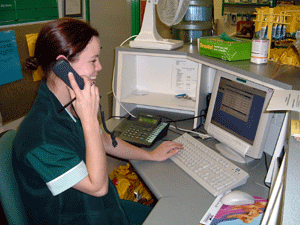
Veterinary Hospitals are required to meet the
requirements for premises training Veterinary Nurses.
The nurse on duty that night was a Student Veterinary Nurse, with her experience
and training, she was able to offer reassurance and advice about transporting
the patient.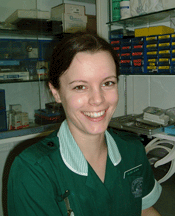
Veterinary Hospitals are required to have Veterinary
Surgeons on call at all times.
When you arrive at the Veterinary Hospital you are met by the veterinary surgeon
on duty and by the nurse.
Quickly a history is taken and Fido is examined and assessed by the veterinary
surgeon. A suspected diagnosis of conker (horse chestnut) poisoning is made.
Veterinary Hospitals are required to have access to a
Poison Information Bureau.
A phone call to the Bureau confirmed the vet’s views on treatment and care.
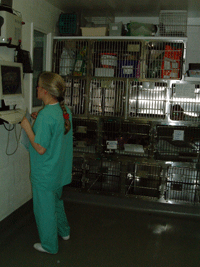
Veterinary Hospitals are required to have accurate
weighing facilities for the complete range of their patients (hamsters to Great
Danes).
Fido is weighed and dose rates are calculated.
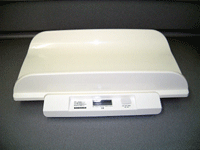
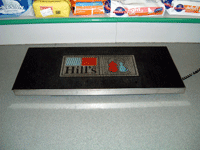
Veterinary Hospitals are required to have the equipment
available for fluid therapy.
An intra-venous drip is set up. A specialised drip pump is used to ensure the
accurate volume and rate of intra-venous fluid infusion is achieved.
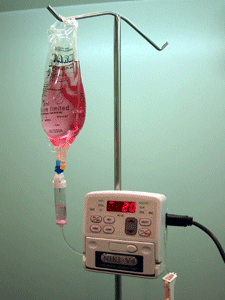
Veterinary Hospitals are required to have laboratory
facilities.
By checking Fido’s blood parameters the vets can ensure that his liver and
kidneys are working OK.
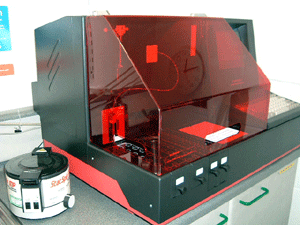
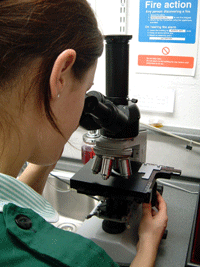
Veterinary Hospitals are required to have appropriate
anaesthesia equipment for their complete range of patients.
Fido is lightly sedated and a stomach tube is passed. Warmed fluids
are used to give a “stomach wash” to remove the pieces of conker.
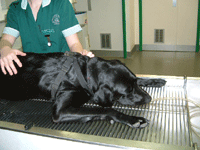
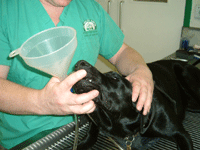
Veterinary Hospitals are required to have facilities
for Endoscopy.
Another option that the vets considered was to anaesthetise Fido and
to pass a flexible fibre-optic endoscope down into his stomach. Then, using a
special grasper, catching and removing the conkers.
Here is a case where an endoscope was used to retrieve a pair of swallowed
knickers
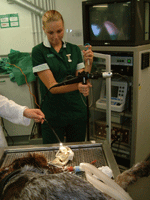
The vet is pretty sure that they have removed the majority of the conkers by the
stomach wash.
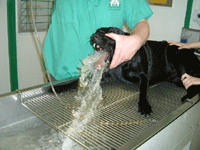
Veterinary Hospitals are required to be able to provide
24 hour nursing care.
Fido is kept under close observation and is monitored overnight.
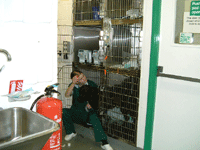
In addition to the nurse physically checking Fido, a web camera is used to allow
the nurse to remotely keep an eye on Fido. The particular system used in Fido’s
Veterinary Hospital allows the vet to check on Fido from home as well.
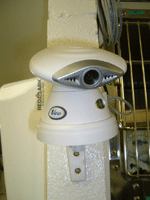
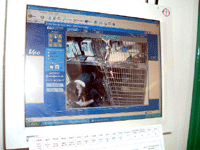
Veterinary Hospitals are required to have radiographic
equipment capable of producing diagnostic images across the whole range of their
patients – from a Hamster’s paw, to looking at the hips of a St Bernard.
If Fido showed any signs of bowel obstruction, then the vets may have
decided to take an X-Ray radiograph to check on the situation.
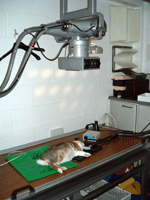
Veterinary Hospitals are required to keep detailed
clinical records of all their patients.
The veterinary surgeon who was on duty at the Veterinary Hospital the
next morning was a different vet than the one on-call the night before. However
the detailed records meant that she was able to continue Fido’s care.
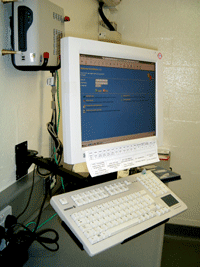
Fido went home later that day – fully recovered. Hopefully he learnt his lesson
and would avoid eating conkers next autumn.
Most Veterinary Hospitals also offer the services of
ordinary veterinary practices, (vaccinations, neutering etc) as well as the more
intensive care and facilities of a Veterinary Hospital.
Fido was checked a few days later and as he was absolutely fine he
was given his booster jab.
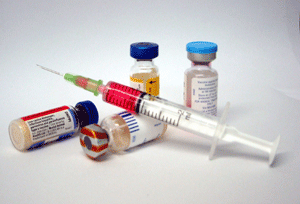
By registering your pets with your local Veterinary
Hospital you know that when you need their services (for example in an
emergency), the vet will have your pet’s previous records to hand.
Use your Veterinary Hospital for the routine care of your pet – and benefit from
the full range of their services when and if you need them.

















